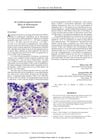2 citations,
March 2020 in “JAAD case reports” A leukemia patient showed skin peeling similar to kwashiorkor, a severe protein deficiency.
January 2019 in “Journal of the Egyptian Women's Dermatologic Society (Print)” People with androgenetic alopecia have a higher risk of heart disease.
 1 citations,
October 2018 in “Infectious diseases in clinical practice”
1 citations,
October 2018 in “Infectious diseases in clinical practice” Azithromycin can rarely cause a severe drop in white blood cells.
 3 citations,
June 1989 in “Diseases of the Colon & Rectum”
3 citations,
June 1989 in “Diseases of the Colon & Rectum” Some patients temporarily lost hair after a certain bowel surgery, but it grew back without needing special treatment.
 77 citations,
January 1989 in “Clinical Infectious Diseases”
77 citations,
January 1989 in “Clinical Infectious Diseases” Toxic Shock Syndrome progresses quickly, often involves multiple organs, and is linked to Staphylococcus aureus toxins, with treatment options available but diagnostic challenges remaining.
 23 citations,
June 1950 in “American journal of diseases of children”
23 citations,
June 1950 in “American journal of diseases of children” Aminopterin was somewhat effective in acute lymphoblastic leukemia in children but did not increase survival time.
 2 citations,
September 2021 in “Orphanet Journal of Rare Diseases”
2 citations,
September 2021 in “Orphanet Journal of Rare Diseases” People with hypohidrotic ectodermal dysplasia are more likely to experience long-term fatigue and hair loss after COVID-19.
82 citations,
May 2010 in “PLoS neglected tropical diseases” Secondary syphilis in Cali, Colombia, shows high Treponema pallidum presence and challenges in early diagnosis, needing better public health strategies.
 September 2016 in “Archives of Pediatric Infectious Diseases”
September 2016 in “Archives of Pediatric Infectious Diseases” A young girl developed serious bone inflammation in her skull after a skin graft, which is a rare but severe condition.
 1 citations,
January 1967 in “The BMJ”
1 citations,
January 1967 in “The BMJ” The document concludes that while some hair and scalp disorders can be treated, hair loss from destroyed follicles is permanent, and damaged hair can only regrow naturally.
 11 citations,
January 2018 in “Annals of Dermatology”
11 citations,
January 2018 in “Annals of Dermatology” Some people experienced temporary hair loss after hair transplant surgery but recovered fully within 10 months.
 18 citations,
January 2016 in “Skin appendage disorders”
18 citations,
January 2016 in “Skin appendage disorders” The paper suggests improving diagnosis and treatment of telogen effluvium but does not recommend a new classification system.
 6 citations,
May 2017 in “InTech eBooks”
6 citations,
May 2017 in “InTech eBooks” Hair loss can cause serious mental health problems and treating it requires a team of experts.
 3 citations,
January 2010 in “Elsevier eBooks”
3 citations,
January 2010 in “Elsevier eBooks” The document describes various skin conditions, their features, and treatments but lacks detailed study size information.
 48 citations,
November 1992 in “International Journal of Dermatology”
48 citations,
November 1992 in “International Journal of Dermatology” Toxic epidermal necrolysis is a severe skin reaction often linked to drugs, requiring careful medication use and supportive care.
 32 citations,
June 1976 in “JAMA”
32 citations,
June 1976 in “JAMA” Crash dieting can cause hair loss due to severe calorie restriction.
 27 citations,
December 2020 in “Experimental Dermatology”
27 citations,
December 2020 in “Experimental Dermatology” Grey hair and baldness may be linked to COVID-19 severity, but more analysis is needed; post-infectious hair loss is related to the severity of the disease and usually recovers within 3-6 months.
 17 citations,
January 2001 in “Clinical and Experimental Dermatology”
17 citations,
January 2001 in “Clinical and Experimental Dermatology” Early treatment with immunoglobulin and aspirin reduces heart complications in children with Kawasaki disease.
 17 citations,
August 1983 in “Australasian Journal of Dermatology”
17 citations,
August 1983 in “Australasian Journal of Dermatology” The review says skin conditions with sterile pustules need more research for better treatments.
 13 citations,
January 2012 in “International Journal of Trichology”
13 citations,
January 2012 in “International Journal of Trichology” Eating too many paradise nuts for cancer prevention caused a woman to lose all her hair due to selenium poisoning.
 12 citations,
February 2001 in “Annals of Pharmacotherapy”
12 citations,
February 2001 in “Annals of Pharmacotherapy” No effective treatment for hair loss after childbirth was found, but it usually gets better on its own and some cosmetic methods might help.
 10 citations,
April 1976 in “Archives of Dermatology”
10 citations,
April 1976 in “Archives of Dermatology” A woman's significant hair loss was linked to rapid weight loss and hormone injections.
 8 citations,
May 2022 in “Journal of medicine and life”
8 citations,
May 2022 in “Journal of medicine and life” COVID-19 patients may experience hair loss, but it's not linked to their age or sex.
 4 citations,
March 2021 in “International Journal of Dermatology”
4 citations,
March 2021 in “International Journal of Dermatology” COVID-19 and related stress may increase hair loss known as Telogen effluvium.
 3 citations,
January 2019 in “Bulgarian Journal of Veterinary Medicine”
3 citations,
January 2019 in “Bulgarian Journal of Veterinary Medicine” The cat was put to sleep due to recurring infections.
 2 citations,
January 2018 in “Elsevier eBooks”
2 citations,
January 2018 in “Elsevier eBooks” Targeted therapies for lung cancer are effective but require careful management of side effects to benefit patients.
 1 citations,
January 2014 in “Side effects of drugs annual”
1 citations,
January 2014 in “Side effects of drugs annual” Antihelminthic drugs treat worm infections but face challenges like low treatment coverage and potential drug resistance, with various side effects reported for different drugs.
 1 citations,
January 2010 in “Elsevier eBooks”
1 citations,
January 2010 in “Elsevier eBooks” Any drug can cause skin reactions, but antibiotics, NSAIDs, and psychotropic drugs are more common, with some reactions being life-threatening.
 1 citations,
April 1976 in “Archives of Dermatology”
1 citations,
April 1976 in “Archives of Dermatology” Sudden weight loss can cause significant hair loss, and using colchicine on the skin for psoriasis may be unsafe.



























